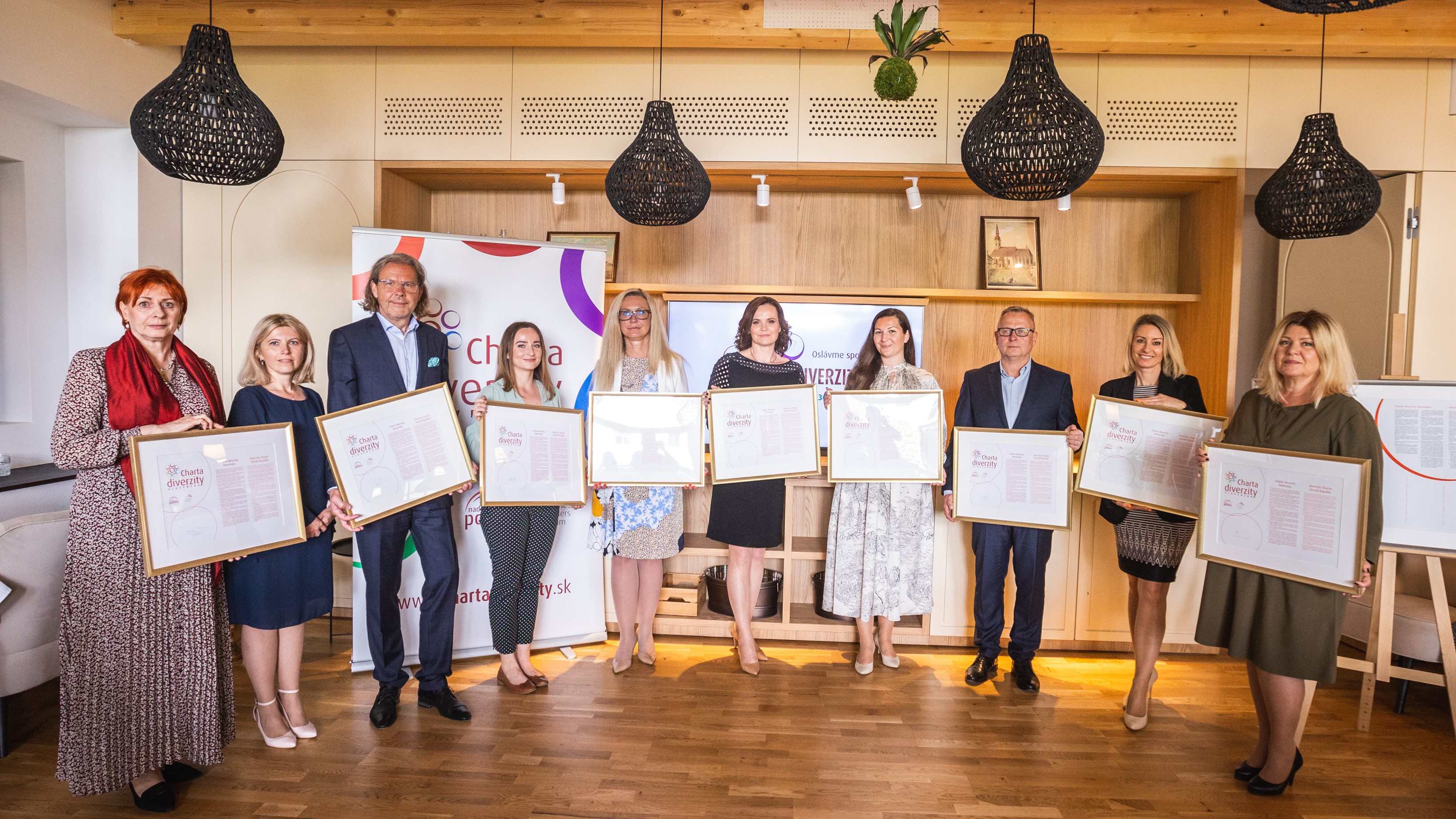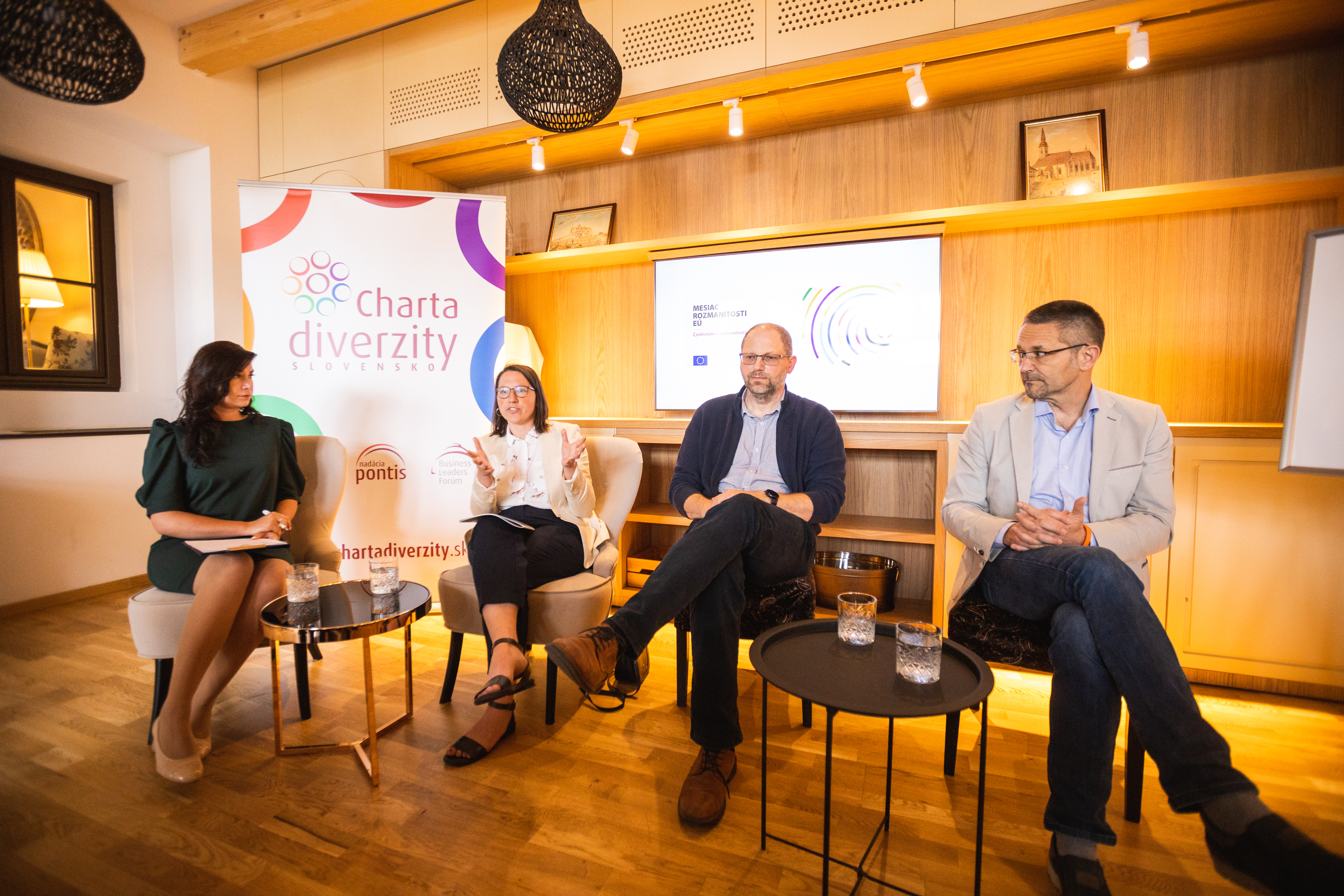EU Diversity Month 2022 in Slovak Diversity Charter

date: 14/08/2022
Women in Leadership
What are the main barriers that prevent women to reach their careers goals? Do companies take into account menopausal periods when assessing their work performance? What are the most common failures of companies in the field of gender equality? These were topics of event held on May 10 via online platform Zoom.
Deloitte regularly conducts the Women in the Boardroom study, which examines the representation of women in corporate governance. Up to 10,500 companies from 51 countries participated in its seventh edition. It shows that progress is happening, but slowly. The global average of women on boards sits at just under 20% (19.7%), an increase of just 2.8 percentage points since the last report, published in 2019. At this pace, the world will not reach parity until at least 2045, over twenty years from now. Zuzana Letková, Partner of Deloitte Slovakia presented the data from global as well as Slovak perspectives.
Elena Kohútiková can be a successful example and a great inspiration of a woman in leadership. During her long-term career in banking sector, she had been a part of a team that built an independent Slovak central bank and currency, and later introduce the euro in Slovakia. Since April 2022, she has been leading the Board of Advisors to the Prime Minister of the Slovak Republic. She advises women not to hesitate to delegate duties, both at work and at home. "You don't have to do everything yourself. Give others more responsibility and create space for yourself. Learn to trust both, your colleagues and your children that they can do many things without you.” According to her, if a woman wants to have a family and at the same time hold a higher position, she must manage time in a very organized way. "As a single mother, I could not afford a lax approach to the timetable and the things that need to be done. I also expected people around me to appreciate my time," said Elena. She also encountered the fact that women seldom asked for a fair salary at a job interview, while men had no problem with that. Throughout her career, she encouraged her female colleagues to trust themselves and be aware of their abilities and skills. She, too, had moments in her life when she doubted herself, but only until she decided on the option. Elena's message for women who want to realize themselves professionally is: “Have dreams, goals and fulfill them. Work with a commitment that matches the amount of your dream salary. And when one day such an offer comes, it will be absolutely natural for you."
During the pandemic, there was more talk about the importance of mental health – and how depression or anxiety can affect work performance. Many companies provided psychological counseling, helplines, or community groups to their employees. And although the menopause may have very similar symptoms and also significantly affect the work performance of an employee, this topic is still taboo. "Menopause is a very individual and unique personal experience for women aged around 45-55. During this period, they can go through 60 different symptoms, and they feel them on average 5 years before menopause itself actually occurs", explained Karin Popovičová, an intern at GSK in London. According to the latest studies, by 2025, up to a billion women in the labor market will be experiencing menopausal symptoms. At the same time, it is alarming that one in four women in this period is considering leaving work. Nevertheless, according to Karin, menopausal women are a neglected group of female employees. "We give pregnant women more time off, the opportunity to park closer or use flexible working hours. Why do not we allow the same for women who are going through menopause, too?

Diversity Day
What impact does the war in Ukraine have on our attitude towards refugees? Are we doing enough to integrate (not only) Ukrainians into our society and the labor market? Why is this situation also an opportunity for Slovakia? We addressed these issues in a panel discussion on the occasion of the Diversity Day, which we celebrated in Slovakia on 30 May for the fifth time. On this day, at the same time, another 10 new signatories joined the Slovak Diversity Charter. The Charter currently has a total of 120 signatories.
"Currently, there is no integration program set by the state, which would have an impact on the local level and would offer methodological instructions and guidelines on how to implement the integration," said Michaela Pobudová from NGO Mareena. According to her, it is not only about refugees from Ukraine, but also migrants who come from countries outside the European Union. For them, the International Organization for Migration (IOM), based in Bratislava and Košice, provides services from public sources. However, it provides services only to those who actively seek them – it is social counseling, language courses or financial subsidies for a retraining course. According to statistics, only a small proportion of eligible people are recipients of such assistance.
"A large number of refugees in such a short time have shown us that we see all the problems in the field of integration under the magnifying glass and concern the whole of Slovakia," said Ján Orlovský, Director of the Migration Office of the Ministry of the Interior of the Slovak Republic. He believes that the state will use this momentum to set up high-quality integration services in sufficient quantities, which will be available at the local level and with allocated financial resources.
People from Ukraine can also help us significantly in the labor market. Central Office of Labour, Social Affairs and Family registered almost 80,000 job vacancies in February this year, a large number of which are difficult to fill with domestic workers. This problem will be even more significant in the future. "People from Ukraine who are university-educated and skilled are coming here, but they work in gastronomy or administrative services, where they do not use their potential. Many of them only need short-term assistance to be able to do the work they have done in the past – for example, providing language training," said Michaela.
As Martin Macharik, an activist and entrepreneur pointed out, not all people coming from Ukraine are available to work. Most of them are mothers with children who do not have the conditions to work, because it is difficult to place Ukrainian children in kindergartens or primary schools. In many cases, they are also traumatized, so, mother has to stay home with the children. Employers can help in this situation. "Find them accommodation, teach them Slovak language and provide them with support in the field of childcare – it's easy, they do not need anything more," he said. There is also a need for flexible work, retraining courses or language training. "Thanks to a few assistance steps, we can really use the potential of the people who come here, which will ultimately benefit our society," added Michaela.
During the signing ceremony of Diversity Charter, the representatives of 10 new signatory companies and organizations (• Accace • Akčné ženy (NGO) • CGI Slovakia • ČSOB • Deutsche Telekom Services Europe Slovakia • Faurecia Automotive Slovakia • Havi Logistics • Ministry of Foreign and European Affairs of the Slovak Republic • PASELL Slovakia • Slovak National Theatre) presented their strategies and goals in field of diversity and inclusion at workplaces.
Besides these two specific happenings, the Charter supported several events organized during the EU Diversity Month. There had been events organized by Charter signatories to promote inclusion & diversity at workplace, events to support LGBT+ community and D&I conference with Charter presentation. Charter has even more actively promoted Diversity Index – an online tool to measure diversity at the workplace, which is a unique tool for employers in Slovakia to assess their measures to support non-discrimination, diversity and inclusion at workplace.
